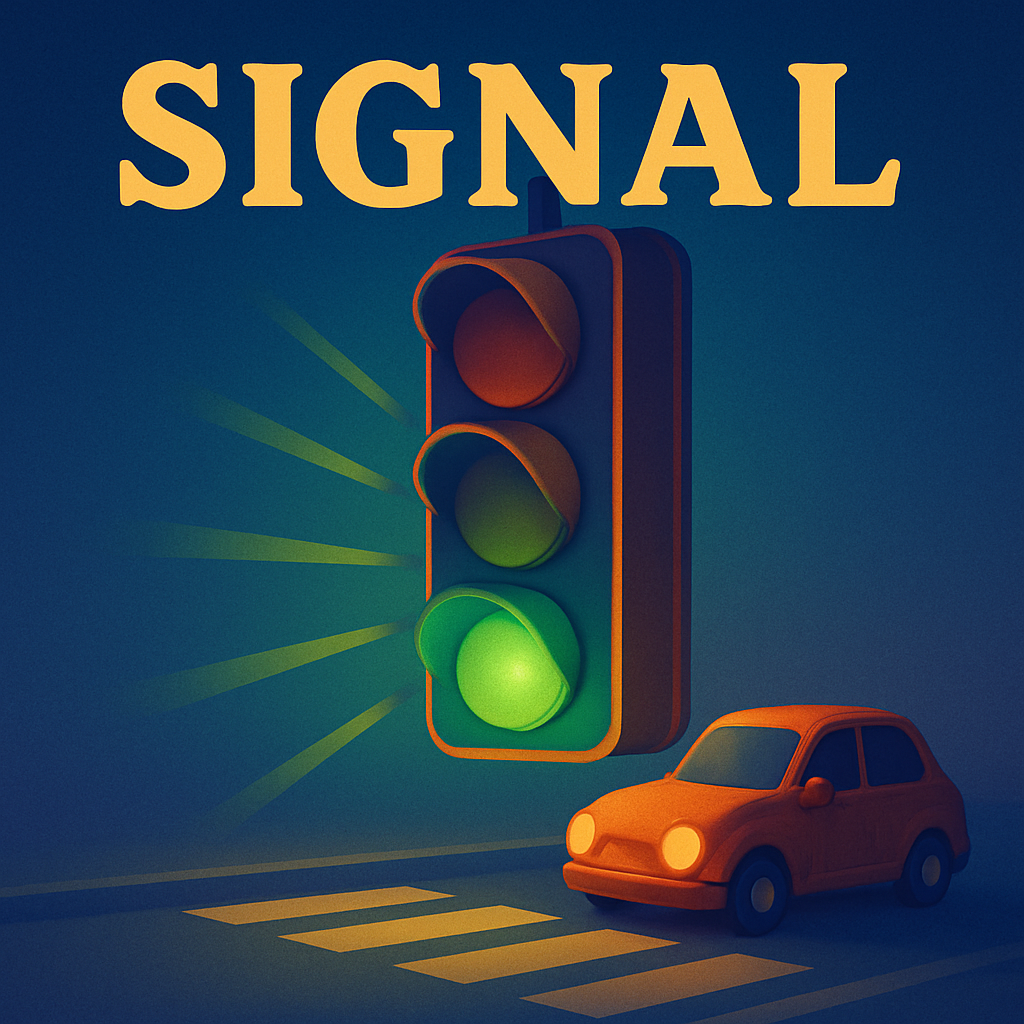Signal
Definition
The word "signal" refers to an action, sound, or visual cue used to convey information (noun), or the act of communicating information through such means (verb).
Parts of Speech
- Noun
- Verb
- Adjective
Pronunciation
American English
- IPA Pronunciation: /ˈsɪɡ.nəl/
- Respelling: SIG-nuhl
British English
- IPA Pronunciation: /ˈsɪɡ.nəl/
- Respelling: SIG-nuhl
Etymology
The word "signal" originates from the Latin word "signum," meaning "sign, mark, or token." It entered Middle English through Old French "signal," maintaining its meaning related to signs and indications.
Derivatives
- Signaling (verb/noun)
- Signaler (noun)
- Significant (adjective)
- Signage (noun)
- Signpost (noun/verb)
Synonyms
- Indicator
- Alert
- Cue
Antonyms
- Noise
- Confusion
- Obscurity
Usage
The term "signal" is widely used in contexts such as communication, transportation, and technology. Examples: "The train stopped at the red signal," and "He signaled for help by waving his hand."
Related Terms
- Transmission: The act of conveying information or signals.
- Sign: A mark, gesture, or object indicating information.
- Beacon: A guiding or warning signal, often in the form of light.
Detailed Definitions
Noun
- An action or device conveying information: Refers to something used to communicate or indicate.
- Example: "The traffic signal turned green."
- A gesture or sign to communicate a message: Indicates an intentional motion or action meant to convey information.
- Example: "She gave a signal to start the presentation."
Verb
- To communicate using a signal: Refers to the act of sending information through gestures, sounds, or devices.
- Example: "He signaled the driver to stop."
Adjective
- Notable or significant: Refers to something important or outstanding.
- Example: "It was a signal achievement in his career."
signal



🇨🇳 Mandarin
- 信号 (Signal, as in a traffic signal or a sign) - xìnhào
- IPA: /ɕin˥˩ xau˥˥/
- Respelling: shin-hao
- 指示 (Signal, as in an instruction or direction) - zhǐshì
- IPA: /ʈʂʐ̩˥˩ ʂʐ̩˧˥/
- Respelling: zhi-shi
🇮🇳 Hindi
- संकेत (Signal, as a sign or indication) - sanket
- IPA: /səŋkeːt̪/
- Respelling: sang-ket
- इशारा (Signal, as in a gesture or hint) - ishara
- IPA: /ɪʂaːɾaː/
- Respelling: i-sha-ra
🇪🇸 Spanish
- Señal (Signal, as in a sign or indication) - señal
- IPA: /seˈɲal/
- Respelling: se-nyal
- Indicación (Signal, as in an instruction or direction) - indicación
- IPA: /indi.kaˈθjon/
- Respelling: indi-ka-thyon
🇫🇷 French
- Signal (Signal, as in a sign or indication) - signal
- IPA: /siɲal/
- Respelling: si-nyal
- Indication (Signal, as in an instruction or direction) - indication
- IPA: /ɛ̃dikasjɔ̃/
- Respelling: in-di-ka-syon
🇸🇦 Modern Standard Arabic
- إشارة (Signal, as in a sign or indication) - Ishara
- IPA: /ʔiˈʃaːra/
- Respelling: i-sha-ra
- علامة (Signal, as in a mark or sign) - alamat
- IPA: /ʕalaːma/
- Respelling: a-laa-ma
🇧🇩 Bengali
- সংকেত (Signal, as in a sign or indication) - saṅket
- IPA: /ʂɔŋket/
- Respelling: shong-ket
- ইশারা (Signal, as in a gesture or hint) - ishara
- IPA: /iʃara/
- Respelling: i-sha-ra
🇷🇺 Russian
- Сигнал (Signal, as in a sign or indication) - signal
- IPA: /sʲɪɡˈnal/
- Respelling: si-g-nal
- Указание (Signal, as in an instruction or direction) - ukazaniye
- IPA: /ʊkɐˈzanʲɪje/
- Respelling: u-ka-za-ni-ye
🇵🇹 Portuguese
- Sinal (Signal, as in a sign or indication) - sinal
- IPA: /siˈnaɫ/
- Respelling: si-nal
- Indicação (Signal, as in an instruction or direction) - indicação
- IPA: /ĩdikɐˈsɐ̃w̃/
- Respelling: in-di-ka-saum
🇮🇩 Indonesian
- Sinyal (Signal, as in a sign or indication) - sinyal
- IPA: /sinjal/
- Respelling: sin-yal
- Indikasi (Signal, as in an instruction or direction) - indikasi
- IPA: /indikasi/
- Respelling: in-di-ka-si
🇩🇪 German
- Signal (Signal, as in a sign or indication) - Signal
- IPA: /ziːɡnaːl/
- Respelling: zee-gnal
- Anzeichen (Signal, as in an instruction or direction) - Anzeichen
- IPA: /ˈanʦaɪçn̩/
- Respelling: ant-sai-chen
🇯🇵 Japanese
- シグナル (Signal, as in a traffic signal or a sign) - shigunaru
- IPA: /ɕiɡɯnaɾɯ/
- Respelling: shi-gu-naru
- 指示 (Signal, as in an instruction or direction) - shiji
- IPA: /ɕiʑi/
- Respelling: shi-ji
🇻🇳 Vietnamese
- Tín hiệu (Signal, as in a sign or indication) - tín hiệu
- IPA: /tiŋ˨˩ hɨəw˧˩/
- Respelling: tin-hieu
- Chỉ dẫn (Signal, as in an instruction or direction) - chỉ dẫn
- IPA: /ci˧˨ ɗən˧˧/
- Respelling: chi-dan
🇰🇷 Korean
- 신호 (Signal, as in a sign or indication) - sinhwa
- IPA: /ɕinho/
- Respelling: shin-ho
- 지시 (Signal, as in an instruction or direction) - jisi
- IPA: /t͡ɕisi/
- Respelling: ji-si
🇹🇷 Turkish
- Sinyal (Signal, as in a sign or indication) - sinyal
- IPA: /sinjal/
- Respelling: sin-yal
- İşaret (Signal, as in a gesture or sign) - işaret
- IPA: /iʃaɾet/
- Respelling: i-sha-ret
🇵🇰 Urdu
- سگنل (Signal, as in a traffic signal or a sign) - signal
- IPA: /sɪgnəl/
- Respelling: sig-nal
- اشارہ (Signal, as in a gesture or hint) - ishara
- IPA: /iːʃɑːrɑː/
- Respelling: i-sha-ra





